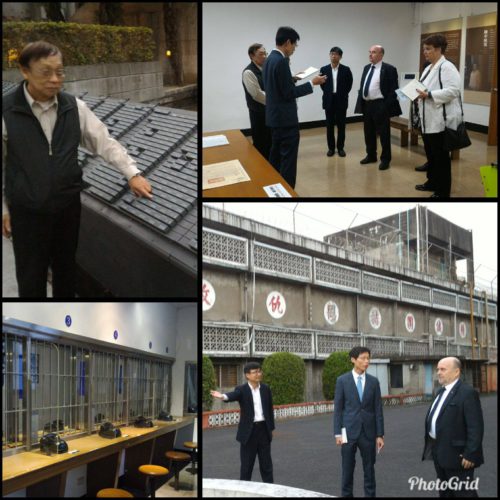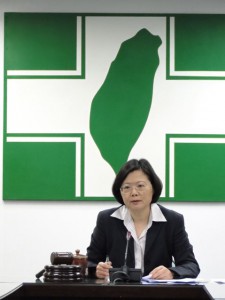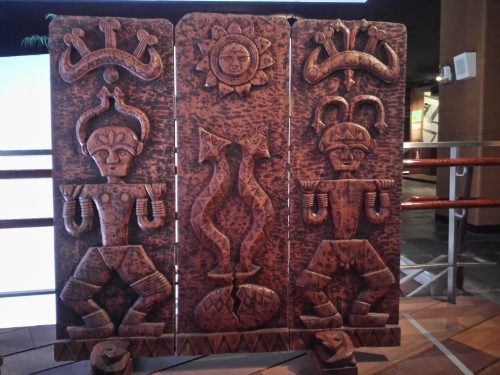The other day, I found this Kuomintang campaign flyer in my mailbox. It looks like a good example of how the party is trying to win over undecided voters by focussing on issues like economy and administrative performance.
Divisive topics like the future of cross-strait relations, national identity and self-identification, references to the Chen Shui-bian era or ad-hominem corruption accusations are largely avoided on this flyer.
By clicking on the pics, you should be able to see the full-res version and read the text.
The front page (on the right in the above picture) contrasts some of the KMT’s and DPP’s candidates for the legislator-at-large seats in the parliamentary election. It was apparently a smart move by the KMT to include some well-respected representatives from outside the political field, even forcing the DPP to reluctantly call this step „commendable“.
The back of the flyer (on the left in the above picture) depicts DPP candidate Tsai Ing-wen as unreliable and constantly changing her opinions. Quoting from media publications, the KMT contrasts Tsai’s former (left) and more recent (right) statements regarding these topics:
- old-age pension for farmers
- 18% preferred savings interest rate for government officials
- ECFA
- nuclear policy
- direct flights to China
- the Kuokuang naphta cracker project
- her identification with the ROC
Comparisons like this are an easy way to discredit a political opponent – look long enough, and you will find examples for every politician contradicting himself. The average reader has no way of verifying if those quotes have been taken out of context or not, nor is he interested in doing so.
On the flyer’s inside, the KMT touts its government performance in the past four years, mostly by quoting statistics and contrasting them with the DPP administration. I will just pick some examples.
- The very first item mentions the price for rice wine, which the KMT claims to have lowered from 180 to 25 NTD, while it had surged from 20 to 180 NTD unter the DPP. Frankly, I do not understand the significance of the price of rice wine for the average voter, but this is one of Ma’s favourite catchphrases that he uses in many campaign speeches.
- The KMT claims that average salaries have risen 2073 NTD during their first three years, but only 1029 NTD during the DPP’s eight years. This contrasts with many ordinary Taiwanese‘ impression that their incomes are stagnating, while the wealthy are better off than ever. The widening wealth and income gap is one of Taiwan’s big problems that voters expect their politicians to solve.
- In terms of economic growth, the KMT proudly mentions a record growth rate of 10.88% for 2011, while the growth rate during the DPP administration was between -1.65% and 6.19%. Now, this could just be a typo, but the 10.88% actually apply for 2010, not 2011. This year, it will more likely be 4.4%. Also, the extraordinary growth of 2010 has to be seen in relation to the -1.9% drop the year before, caused by the global economy crisis. Taking 4.4% for 2011 and the historical data from this site, I get at an average growth rate of 3.8% for the years 2000-2007 and 3.4% for the years 2008-2011.
Of course, you can prove – or refute – almost everything by carefully selecting the „right“ statistics to quote. Politicians and campaign managers are especially good at that, not only in Taiwan.
Also, there is no law requiring parties to be fair or balanced in their campaigning. I remember well how, during Germany’s 2005 campaign, then-chancellor Gerhard Schröder ruthlessly attacked Angela Merkel’s superior tax concept, ad nauseam raising the example of a poor single mom night nurse who would have to pay higher taxes if the conservatives got their way. In the end, Schröder still lost, but it might have been this zeroing in on an actually irrelevant side aspect that cost Merkel’s party so many votes she had to enter a Grand Coalition with Schröder’s party.
I think this KMT flyer shows – amongst other things – that campaigning in Taiwan can actually be quite similar to Western democracies. Like everywhere, parties selectively use (sometimes misleading) statistics in order to win over undecided voters. But at least, they can appeal to reasoning, not only to deep-seated resentments. If they choose to do so.
I am a German reporter living and working in Taiwan. Click here for more English posts on this otherwise mostly German blog. You can also follow me on Twitter, Facebook, Google Plus and Plurk.
Other posts you might want to have a look at:
- 10 English online sources of information about Taiwan’s upcoming elections
- How Taipei citizens do not get a second forest park, but just another shopping mall
- Cheap labor, no rights? Taiwan’s 2nd class foreigners
- Jingmei Prison shows how Taiwan does not deal with its past
- The strange case of Hsu Hsin-liang, who says he wants to run for President
Please keep your comments focussed on the matter at hand – the content of the flyer and its implications for the current campaign. I will not publish partisan bickering or comments that serve no other reason than to glorify one party/candidate or discredit the other.
Das könnte auch interessant sein:
- 10 English online sources of information about Taiwan’s upcoming elections
- How some people experienced the rallies on Taiwan’s Super Sunday. And tweeted about it.
- Taiwan presidential candidate Tsai Ing-wen on cross-strait relations (English videos)
- No kidding: The KMT website got my newsletter blocked
Powered by YARPP.









Eine Antwort
Ich hab das Gefühl, jemand ist ganz schön verunsichert, wegen der Umfragewerte natürlich, ob sie nun die Wahl überhaupt gewinnen können.
Wenn ich diese Tage so fernsehe, frage ich mich manchmal, genau wieviele TV-Sender unter dem Einfluss von KMT oder eben DPP stehen…